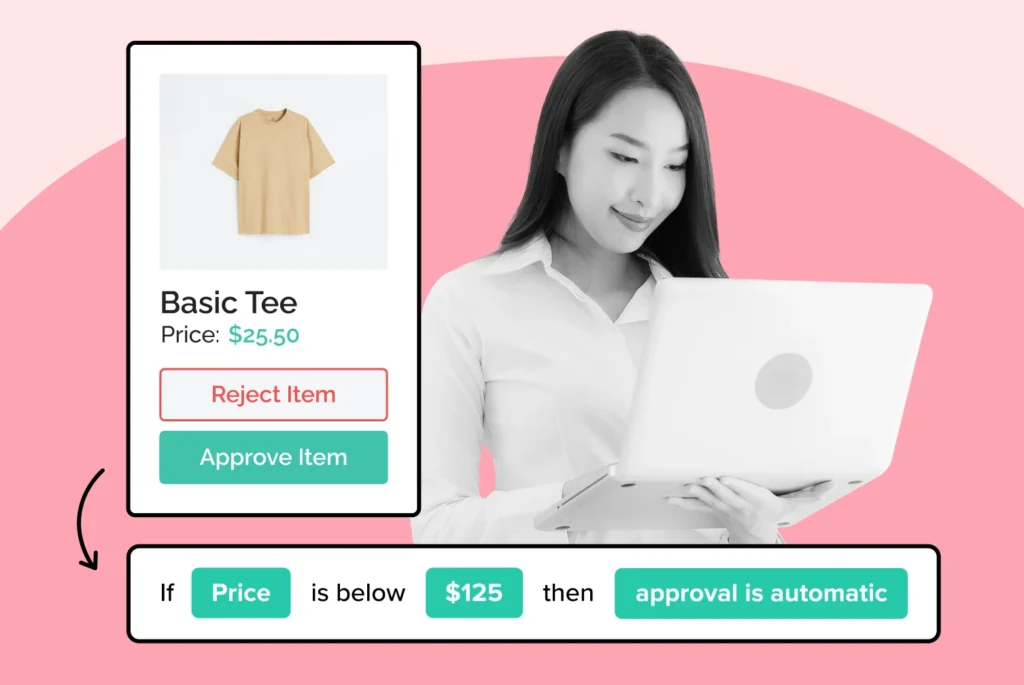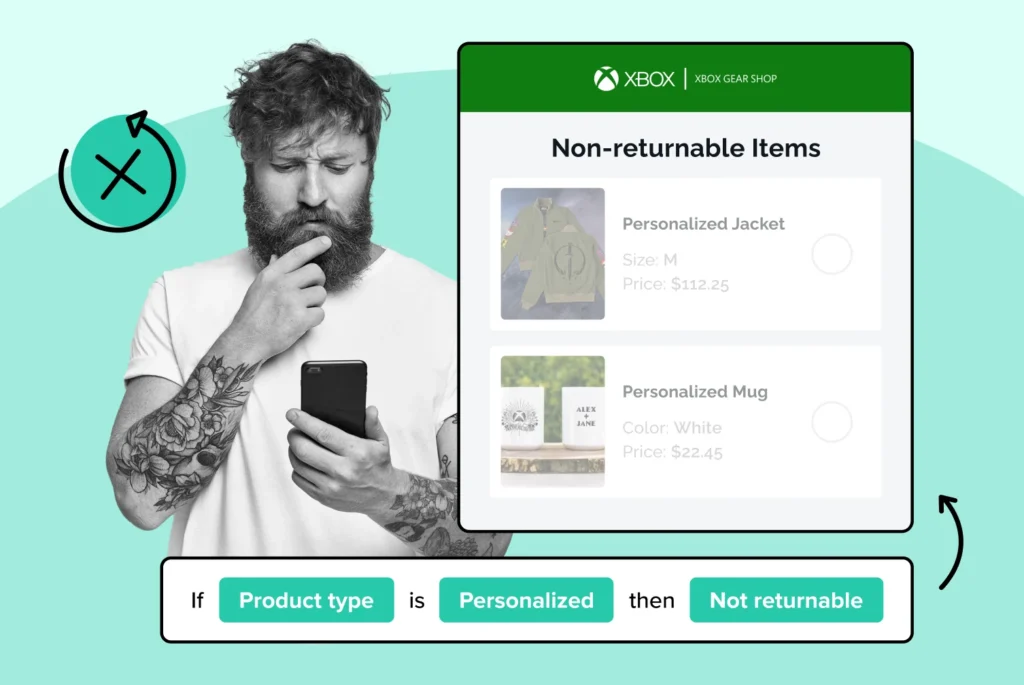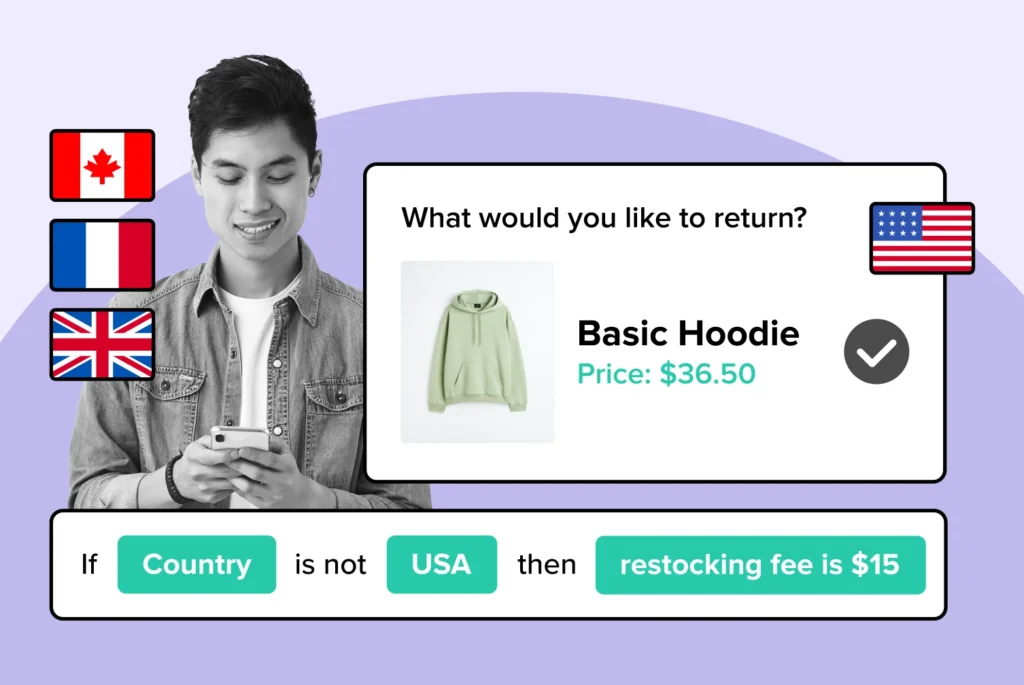
Returns Management: Lessons From the Kitchen – Crafting a Seamless E-Commerce Experience
Environmental stakes are higher than ever: discover how your business can adapt its returns process to be part of a greener eCommerce future.
Boost customer experience and reduce support tickets
Realtime order and shipment tracking
Proactive order and shipping notifications
Predictive pre-purchase estimated delivery dates
Self-Serivce branded order tracking
Effortless experience delivered
Make returns profitable and delight customers
Flexibility to define any return destinations & conditions
Simplify returns for your customers and team
Incentivize exchanges over returns
Returns management made easy for your team
Understand why your customers are returning
Unify the online and the in-store experience
Hassle-free pickup experience for customers
In-Store Dashboard to keep operations streamlined
In-Store and Online orders unified
Drive foot-traffic to your stores
Boost customer experience and reduce support tickets
Realtime order and shipment tracking
Proactive order and shipping notifications
Predictive pre-purchase estimated delivery dates
Self-Serivce branded order tracking
Effortless experience delivered
Make returns profitable and delight customers
Flexibility to define any return destinations & conditions
Simplify returns for your customers and team
Incentivize exchanges over returns
Returns management made easy for your team
Understand why your customers are returning
Unify the online and the in-store experience
Hassle-free pickup experience for customers
In-Store Dashboard to keep operations streamlined
In-Store and Online orders unified
Drive foot-traffic to your stores
Find the answer to all your questions
Explore the most comon questions about WeSupply
Calculate the ROI that WeSupply can bring you
Request a no strings attached review of your current shopping experience and missed conversion opportunities
Take a step by step trip through our functionality to see how we can improve your ecommerce processes.
Read actionable articles on how to optimize your post-purchase experience and decrease support tickets
Get inspired by stories of how our customers implemented an effortless post-purchase experience
A Deep Dive into Top Companies' Order Tracking & Returns Strategy
Wondering if WeSupply is a good fit for you? Read through our use cases to see how we can help you increase conversion & improve CX!

Understanding why customers return items in e-commerce can be as revealing as understanding why people form lasting relationships. The key lies in attachment styles on ecommerce returns: secure, anxious, and avoidant. This article explores how each style influences return behavior, offering insights for businesses to optimize their return processes and build better customer relations. Learn how recognizing attachment styles can transform your approach to e-commerce returns and customer satisfaction.
Attachment styles, derived from psychological theory, correlate with consumer behavior in eCommerce, especially regarding the returns process, with secure attachments leading to trust and positive experiences, anxious attachments requiring validation, and avoidant attachments preferring independence.
Customizing the online returns process to accommodate different attachment styles can enhance customer satisfaction, reduce return rates, and contribute to creating a loyal customer base and sustainable business growth.
Evaluating the success of attachment style-based strategies in eCommerce involves analyzing key metrics like repurchase intention, loyalty, trust, and word-of-mouth, along with customer feedback to refine strategies and cater to diverse customer needs.
WeSupply transforms eCommerce returns with tailored solutions for diverse attachment styles. Features include self-service returns, flexible return rules, branded portals, and proactive notifications. Integrations with review platforms, autogenerated QR codes, and custom policies empower businesses to reduce return rates. With logistics analytics and customer feedback analysis, refine your approach. Ready to revolutionize your returns? Get started with WeSupply today!
The dynamics of eCommerce have an uncanny resemblance to interpersonal relationships. Whether it’s the trust in a brand mimicking the trust in a friend or the anxiety during returns reflecting insecurities in human relationships, the patterns are strikingly similar. It’s here that the attachment theory, originally focused on child development, finds an unexpected application in eCommerce.
Grasping the concept of diverse attachment styles – secure, anxious, and avoidant, enables us to predict customer behavior and refine eCommerce strategies, especially regarding the pivotal aspect of returns.
Attachment theory, developed by British psychologist John Bowlby, explains the lasting emotional bonds between people, from the bond between an infant and caregiver to that between romantic partners. The theory suggests that these early attachments significantly influence our patterns of behavior throughout life, including:
Shopping habits
Relationship dynamics
Parenting styles
Emotional regulation
Understanding attachment theory can provide valuable insights into our own behaviors and social and personal relationships.
The scope of this theory now encompasses adult relationships and surprisingly extends to customer dynamics in eCommerce. It has been observed that attachment styles – secure, anxious, avoidant, and disorganized – can significantly impact customer behavior during the returns process. For instance, customers with an anxious attachment style may require more reassurance and clear communication throughout the returns process to feel secure. On the other hand, those with an avoidant attachment style might prefer a more self-service approach.
Interpreting these styles allows businesses to foresee customer behavior, refine the returns process, and uplift the overall customer experience in eCommerce.
Attachment styles profoundly shape customers’ interaction with eCommerce stores, molding their emotional responses to the online shopping journey, inclusive of the returns process. For instance, customers with anxious attachment styles may require more validation and reassurance during the return process. Those with avoidant attachment styles have a preference for a self-service approach and are less likely to seek customer service support. They tend to be independent of returns and less inclined to request assistance..
Securely attached customers, on the other hand, tend to have a strong sense of self-worth, value mutual respect and trust, and are more optimistic during the returns process. Comprehending these styles along with their impact on eCommerce behaviors can shed light on the influence of emotional regulation and relationship dynamics on shopping tendencies. This understanding can lead to more effective strategies to mitigate excessive shopping and improve customer experiences online.
Regardless of the customer attachment styles, with WeSupply’s Flexible Return Rules, eCommerce platforms can adapt to various consumer needs and behaviors. WeSupply enables businesses to implement smart return rules that align perfectly with all item attributes, enhancing the shopping experience. By setting conditions such as free return shipping with fully-customizable logics, they cater to different attachment patterns, ensuring a seamless process. Additionally, their use of intelligent dispositions for sorting physical returns simplifies the process, making it more efficient and user-friendly, thus shaping consumer perceptions and actions in a positive way.
Reduce Operating Cost with Advanced Return Policies
There are many moving pieces in ecommerce logistics. Book a quick call with our experts to see how WeSupply can help you take control by creating custom policies to handle them all easily.
The secure attachment style is characterized by a strong sense of self-worth and healthy relationship values. Customers with secure attachment styles are more likely to trust online stores and have positive experiences with product returns. They are good candidates for leaving reviews and providing feedback due to their comfort with emotional intimacy and effective communication skills.
Cultivating positive online return experiences for securely attached customers can foster long-term relationships and trust in the eCommerce store. Businesses can bolster the sense of security and satisfaction for customers with a secure attachment style through transparent communication and personalized support during the return process.
Moreover, tailoring the returns management process to securely attached customers can lead to a loyal customer base and drive sustainable growth for the business. Understanding the customer’s expectations and desires is vital in building trust, especially for those with a secure attachment style who seek reliable and genuine connections with online retailers.
With WeSupply, cultivating a positive online return experience and building trust among customers with a secure attachment style becomes effortlessly achievable. By offering a self-service returns process that puts control in the hands of shoppers, WeSupply addresses the desire for a frictionless eCommerce returns experience, which is favored by most consumers. Moreover, through their emphasis on logistics analytics and data-driven decision-making, businesses can track metrics like CSAT and NPS, enabling them to continuously refine their post-purchase customer experience. This commitment to measurement and improvement fosters a sense of reliability and satisfaction, key components in nurturing secure attachment styles among online shoppers.
Avoidant shoppers prioritize independence and self-sufficiency in their relationships, making their interaction with eCommerce a unique journey. They prefer to find alternative solutions by themselves rather than returning products. Therefore, offering options such as product exchanges or DIY repair guides can cater to their desire for self-reliance.
The eCommerce platform should ensure that the self-service portal for returns is user-friendly and intuitive, as this aligns with the avoidant customer’s preference for handling issues on their own. In addition, providing clear and concise product information can help avoidant shoppers make informed decisions without the need for further interaction, which aligns with their preference for self-sufficiency.
WeSupply offers solutions tailored to navigating the world of the avoidant shopper, prioritizing autonomy in returns and brand interaction. With a self-service returns process, WeSupply empowers shoppers with complete control, meeting the demand for a frictionless eCommerce returns experience, as desired by 70% of consumers. Key features include:
Branded Returns Portal: Offering a branded, omnichannel experience for enhanced brand interaction and customer loyalty.
Instant Credit Option: Encouraging exchanges over refunds, reducing return rates, and increasing average order value through instant store credit incentives.
Ready to turn those avoidant shoppers into loyal customers? Book a demo with WeSupply and let’s make magic happen!
Anxious consumers often use shopping as a coping mechanism for emotional distress. This group may require more validation and reassurance during the return process, as they may experience anxiety about being rejected or abandoned. Stress and anxiety are significant underlying causes of compulsive shopping, as individuals may use shopping as a coping mechanism to deal with these emotions.
Catering to the distinct needs of anxious consumers necessitates an understandable and equitable returns policy that is readily accessible on the website. In addition, customer service can play a crucial role in addressing concerns and preventing returns by suggesting alternatives, such as exchanges for the correct sizes. This helps in building customer loyalty and reduces the likelihood of returns.
WeSupply caters to the needs of the anxious consumer by providing reassurance and support throughout the returns process. Key features include:
With WeSupply, alleviate the concerns of compulsive buyers and instill confidence in your brand’s commitment to customer satisfaction.
In eCommerce, the application of attachment theory can forecast key marketing metrics like brand attachment, which influences:
Repurchase intention
Loyalty
Trust
Positive word-of-mouth
All vital for steady business growth. Moreover, tailoring the returns process according to the attachment styles—secure, anxious, avoidant, and disorganized—can lead to more satisfied customers and stronger, longer-lasting relationships.
While securely attached customers value clear and consistent communication, those with an anxious attachment style may require more reassurance and clear communication throughout the returns process to feel secure. On the other hand, those with an avoidant attachment style might prefer a more self-service approach. Interpreting these styles allows businesses to foresee customer behavior, refine the returns process, and uplift the overall customer experience in eCommerce.
The deployment of strategies customized to various attachment styles can aid in reducing eCommerce returns. For instance, focusing on detail-rich product descriptions can ensure customers have a clear understanding of what they are purchasing, minimizing the discrepancy between the product’s online representation and its real-life counterpart. Using high-quality imagery and videos for products can help customers better visualize items and reduce returns due to unmet expectations regarding the look and feel of the product.
In response to the spike in online returns during the 2020 COVID-19 e-commerce boom, EVEREVE tackled the high return rates plaguing the apparel industry by overhauling their return process. Leveraging WeSupply’s integrated technologies, they automated returns, enabling self-service and flexibility for customers. This shift not only streamlined operations but also fostered customer loyalty and reduced the burden on their customer service team. With this new approach, EVEREVE turned a challenge into an opportunity, enhancing both customer satisfaction and business efficiency. Discover how EVEREVE redefined the returns experience to boost customer satisfaction and streamline operations in the full case study.
Establishing emotional bonds with securely attached shoppers can boost customer trust and loyalty. Securely attached customers value authenticity and consistency in messaging, product quality, and customer service. As a result, maintaining these elements is crucial for building trust with these customers.
Some strategies to build trust with securely attached shoppers include:
Using a customer’s name in communication
Recommending products based on past purchases
Providing personalized offers and discounts
Offering excellent customer service and resolving issues promptly
By implementing these strategies, you can make securely attached shoppers feel valued and build trust with them.
Implementing loyalty programs that reward customers for their purchases and engagement can enhance trust and encourage securely attached shoppers to maintain a long-term relationship with the brand, thereby improving customer retention. Moreover, providing transparent communication about company practices, sourcing, and pricing can help securely attached shoppers feel more confident in their purchasing decisions, thereby increasing trust.
WeSupply excels in building emotional connections and enhancing trust with securely attached shoppers through its thoughtful features and integrations. Key highlights include:
Proactive Notifications: Keep customers engaged and informed with post-purchase email and SMS notifications, boasting an impressive open rate. Offer personalized deals and proactive return notifications to encourage repeat purchases and foster loyalty.
Combat inconvenience with proactivity & self service
Book a quick call with our experts to see how WeSupply can help you make returns easy for your customers with a beautiful, self-service solution that makes their experience easier while also providing new ways to lower costs and earn back revenue.
With WeSupply, businesses can strengthen their relationships with securely attached shoppers by delivering personalized experiences and building trust through every interaction. Ready to elevate your customer trust? Book a demo now and start connecting with your customers on a deeper level!
Avoidant shoppers possess distinct requirements in eCommerce, and fulfilling these can enrich their shopping experience. They value their privacy, so it is important for eCommerce sites to have strong data protection measures in place and to communicate this clearly to the customers. Offering a range of payment options, including those that do not require personal account creation or subscription, can cater to avoidant individuals’ need for autonomy and non-commitment.
Streamlining the checkout process without mandatory account registration can reduce the perceived pressure and commitment, often avoided by customers with an avoidant attachment style. Furthermore, highlighting product reviews and ratings from other customers can provide avoidant shoppers with social proof and indirect peer feedback, which may influence their purchasing decisions without the need for direct interpersonal engagement.
WeSupply addresses the unique needs of avoidant attachment style customers in ecommerce through tailored integrations and features. Key highlights include:
Integration with Various Review Platforms: Engage customers and drive sales with user-generated content through platforms like Loox, Stamped, Yotpo, Okendo, Junip, and Reviews.io. Showcase genuine reviews and ratings, boost recurring sales with SMS marketing, and capture high-impact user-generated content to enhance the shopping experience.
Anxious shoppers frequently require increased support and affirmation throughout the shopping and return process. A consumer-friendly returns policy can provide reassurance to anxious shoppers, reducing the perceived risk of a purchase and potentially mitigating compulsive buying behavior. Anxiety in consumers can be alleviated by a straightforward returns process that is easy to follow and requires minimal effort, which can improve overall customer satisfaction and loyalty.
Offering educational resources such as how-to guides, video tutorials, and packaging inserts can assist customers in using products correctly and reduce returns due to difficulty in set-up or use. Implementing robust quality control measures to inspect products for defects and ensuring secure packaging can decrease returns caused by damaged or defective items.
WeSupply offers robust support for anxious shoppers, employing strategies to validate concerns and reduce return rates effectively. Key features include:
Autogenerated QR Code Return Labels: Simplify the return process by allowing customers to scan QR codes from emails, eliminating the need for printing and reducing anxiety associated with returns.
Self-Service Returns Process: Fulfilling the desire for a frictionless returns experience, WeSupply empowers customers with complete control over returns, aligning with the preferences of 70% of shoppers.
Assessing the effectiveness of strategies based on attachment theory entails gauging key relationship marketing metrics like:
Repurchase intention
Loyalty
Trust
Positive word-of-mouth
By tailoring returns management strategies to different attachment styles and using data analysis to identify patterns in return behavior, businesses can evaluate the effectiveness of these strategies.
Understanding customers’ attachment styles and adjusting products and services accordingly can help create a loyal customer base and drive sustainable business growth through strong consumer relationships. It’s also important to measure the impact of changes informed by customer feedback, comparing the performance of strategies before and after implementation.
Monitoring sales, returns, and customer support inquiries after implementing changes based on customer feedback helps measure the effectiveness of these changes and guide further strategy refinements.
WeSupply plays a pivotal role in boosting ROI by offering tools and insights to measure the success of attachment theory-based strategies in ecommerce. Through comprehensive analytics and data-driven decision-making, businesses can assess the impact of their strategies on customer attachment styles and tailor their approach for optimal results. With WeSupply’s assistance, businesses can unlock valuable insights to enhance customer relationships, drive repeat purchases, and ultimately increase ROI. Ready to see how WeSupply can amplify your returns? Calculate your ROI now with our ROI Calculator and watch your profits soar!
Scrutinizing customer feedback is essential for polishing attachment-based approaches. Direct insights into customer satisfaction and areas needing improvement can be gleaned from customer feedback. Customer feedback can reveal usability issues on eCommerce websites or apps, prompting changes to improve aspects like checkout processes, search functionality, and mobile responsiveness.
Collecting and analyzing customer feedback through surveys, feedback forms, and social media engagement provides an unfiltered view of customer opinions and trends, which are valuable for eCommerce strategy refinement. Breaking down feedback into demographics and customer segments allows businesses to tailor their eCommerce strategies more effectively to different groups, aligning with attachment-based marketing.
WeSupply recognizes the paramount importance of customer feedback in refining attachment-based approaches. Our logistics analytics solution provides businesses with the means to measure and analyze customer feedback effectively. We understand that continuous improvement is key to fostering delightful post-purchase experiences and building strong customer relationships. By tracking metrics such as CSAT and NPS, businesses can gain valuable insights into customer sentiments, enabling them to adapt and refine their strategies accordingly. With WeSupply, your voice as a customer matters, and we’re dedicated to helping you enhance your attachment-based approaches for maximum impact and satisfaction.
The application of attachment theory in varied markets brings forth its unique set of challenges. Attachment theory, which originally developed in Western contexts, may not fully account for the significance of multiple attachments in a child’s life, especially outside a Western framework. The concept of attachment security as a core element of attachment relationships may also need to be reconsidered or broadened to encompass diverse cultural contexts and parental values.
To improve the application of attachment theory in diverse markets, it is important to consider the cultural dimensions of attachment, recognizing that the expression of attachment behaviors may vary across different societies. Moreover, understanding the underlying attachment-related fears and concerns of employees can guide leaders in how to approach change management with sensitivity.
As we have explored throughout this article, understanding and integrating different attachment styles into eCommerce strategies can optimize the returns process and enhance service to customers. By tailoring strategies to the needs of securely attached, anxious, and avoidant customers, eCommerce businesses can build stronger relationships, foster customer loyalty, and ultimately reduce return rates.
Embracing the insights drawn from attachment theory lets eCommerce businesses foster profound connections with their customers, steering towards sustainable business growth.
In conclusion, the application of attachment theory to eCommerce strategies offers promising opportunities for enhancing customer relationships and reducing return rates. By understanding the unique needs of customers based on their attachment styles, eCommerce businesses can tailor their approaches to provide a more personalized and satisfying shopping and return experience. This not only fosters trust and loyalty but also contributes to sustainable business growth.
WeSupply revolutionizes eCommerce returns by addressing the influence of attachment styles with tailored solutions. Our platform offers features such as self-service returns, flexible return rules, branded returns portals, and proactive notifications to cater to the diverse needs of consumers. By integrating with various review platforms, providing autogenerated QR code return labels, and offering custom return policies, we empower businesses to reduce return rates and boost customer satisfaction. With logistics analytics and customer feedback analysis, we enable businesses to refine their attachment-based approaches and enhance the overall post-purchase experience. Ready to transform your eCommerce returns? Get started with WeSupply and revolutionize your customer relationships today!
Attachment theory in business posits that people have a natural tendency to form close relationships with others, which shapes behavior and personality.
A business’s attachment style can be measured in two dimensions: secure attachment, which reflects the willingness to rely on business partners, and close attachment, which measures the desire to form personal bonds with partners or employees. Establishing these dimensions helps understand a business’s approach to partnerships.
The two major types of insecure attachment are anxious-preoccupied and avoidant-dismissive. These are identified based on attachment theory and are commonly discussed in psychology.
WeSupply provides a range of solutions tailored to handle eCommerce returns effectively. These include self-service returns, flexible return rules, branded returns portals, and proactive notifications.
WeSupply recognizes the impact of attachment styles on eCommerce returns and offers features designed to accommodate various consumer preferences. This includes integrating with various review platforms, providing autogenerated QR code return labels, and offering custom return policies.
Yes. WeSupply has an Official Shopify App. You can download it and start integrating with your Shopify Store.
Yes, WeSupply has an official extension for Magento. The WeSupply x Magento integration allows for automating order tracking experiences, reducing customer inquiries, automating shipping email and SMS notifications, and providing a fully branded order tracking experience
Yes, WeSupply has an official BigCommerce App. You can integrate WeSupply with your BigCommerce store to improve your post-purchase customer experience.

Learn How To Create Successful Post Purchase Email Campaigns
Build an effective post-purchase email flow that helps you increase customer satisfaction and drive revenue growth!

Environmental stakes are higher than ever: discover how your business can adapt its returns process to be part of a greener eCommerce future.

How luxury brands strive to ensure exclusivity in luxury returns: crucial for maintaining brand prestige and customer loyalty!

Learn pragmatic strategies in this article to effectively tackle returns, keep your customers happy, and fortify your bottom line.

Vital sustainability metrics to track in eCommerce: from assessing carbon output to reducing packaging waste!

Environmental stakes are higher than ever: discover how your business can adapt its returns process to be part of a greener eCommerce future.

How to manage returns for custom-made products: from establishing transparent policies to applying effective quality control measures!

Strategies that can reduce your return-related carbon footprint, save costs, and resonate with environmentally-conscious consumers.

Vital sustainability metrics to track in eCommerce: from assessing carbon output to reducing packaging waste!

Let’s explore how the anchor – often the initial price – can impact return rates, satisfaction, and ultimately, a business’s bottom line!